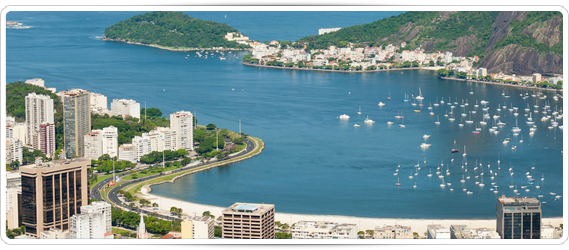Rio De Janeiro
Rio de Janeiro, Brazil
Rio de Janeiro, Brazil, a global city renowned for beautiful beaches and vibrant culture, is also increasingly known for its leadership on urban sustainability. With a metropolitan area of 11 million people, the City faces an array of challenges related to transportation, housing, sanitation, environmental protection, and development; however, with the 2014 FIFA World Cup and the 2016 Olympic Games on the horizon, the City and State of Rio de Janeiro are investing in innovative responses to these challenges.
Policies, financing, and creative programs are providing the backdrop for urban revitalization and sustainable growth in Rio de Janeiro. For example, the 'Morar Carioca' program is improving housing and services in informal settlements, while 'BikeRio' is creating a cycling culture around cleaner and more accessible transport, and Bolsa Verde do Rio de Janeiro lays the groundwork for innovative emissions, effluent, and ecosystem services markets. Across this City, agencies from all levels of government, non-governmental organizations, academia, and the private sector are working together to approach long-standing and emerging challenges with fresh ideas and clear commitment.
On this site, you will find some of the ways that Rio de Janeiro is building towards a green, innovative, inclusive future.
Letter from Eduardo Paes (English and Portuguese)

EPA's construction and demolition (C&D) materials management policies focus on safe, beneficial use of the debris generated during construction, renovation, and demolition of buildings, roads, and bridges in order to conserve landfill space, avoid the resource impacts of new materials, create jobs, and reduce new project expenses.
Morar Carioca: Integrating Informal SettlementsAs in many large cities in the developing world, a large portion of the population of Rio de Janeiro lives in informal settlements or slums, called favelas.
Municipal Recycling Collection ExpansionCurrently, the City of Rio de Janeiro gathers only 1 percent of recyclables through official collection of separated materials, and reaches less than one-third of the City through its efforts.
Rio "Bicycle Capital City"Increased bicycle infrastructure in urban environments promotes the importance of cycling as a mode of transportation, resulting in improved urban mobility, environmental quality, social inclusion, and economic benefits.
Sub-National Climate Change PoliciesUnderstanding the challenge that climate change presents at a sub-national level, both the State and the City of Rio de Janeiro have passed nation-leading sub-national climate change laws and instituted policies to decrease emissions and improve sustainability in the region.
Certificates of Potential Additional Construction (CEPACs) are a method of leveraging private dollars to finance public investment in neighborhood revitalization through a process of rezoning and construction permit auctions.
Climate and Green BondsClimate and green bonds are fixed-income financial instruments that are issued in order to raise capital for the implementation of environmental projects, often climate change mitigation- or adaptation-related activities or renewable or energy efficiency projects, and therefore allow investors to report to their members on how their secure investments are also contributing to addressing environmental challenges.
Energy Service Company (ESCO) ModelThe ESCO model was developed to recoup the savings from implementing more energy efficient strategies onto commercial and industrial properties.
Special Service District or Business Improvement DistrictThe SSD/BID is a defined area within which businesses are required to pay an additional tax or fee in order to fund improvements within the district's boundaries.
Tax Increment Financing (TIF)As is evident in major cities around the United States, TIF can be a valuable public finance tool for redevelopment projects.
Asta, a social business and producers/direct-sales network, has worked since 2008 to "transform lives by producing 'for good'" -promoting the production and distribution of quality goods that also do good for those in the network and Brazilian society at large.
Baixada de Jacarepaguá Water InfrastructureSince 1995, the Baixada de Jacarepaguá area was the fastest growing region of Rio de Janeiro in terms of population and new construction, but the lack of available potable water seriously threatened the quality of life in the region.
"Bike Rio" SystemSince 2011, the "Bike Rio" project has installed an integrated system of over 60 bicycle stations in fourteen major neighborhoods (over 600 bicycles) for use in Rio de Janeiro.
Crowd-Sourcing Green EntrepreneursRio de Janeiro's entrepreneurial culture is helping the City build a greener economy.
Gramacho Landfill Gas to Energy SystemThe Gramacho Landfill was receiving over 3 million metric tons of waste per year until 2012, producing at its peak 119 million Nm3 methane (normal cubic meter CH4) through decomposition within the landfill, which represents both a contribution to global climate change and a loss of a potential low-pollution energy source.
Integrating Transport Modes for SustainabilityIn the City of Rio de Janeiro, a staggering 74% of motorized trips take place by public transportation, and traffic congestion is at an all-time high at more than one hour of commute time (per trip) on average.
Morar Carioca "Verde": Greener DevelopmentThe Rio de Janeiro Municipal Secretariat of Housing (SMH) made respect for the environment a core principle of its interventions in the "favelas" (slums) of the City.
Porto Maravilha: Urban Waterfront RevitalizationSince the 1970s, the Port of Rio de Janeiro has fallen into disrepair-currently 1 million m2 of real estate are under-occupied and many historic buildings have not been kept up.
Rio Bus Rapid TransitBus Rapid Transit systems (BRTs) provide high-quality, fast, and cost-effective high-capacity transportation by creating dedicated lanes, set stations, and regular and frequent service, greatly improving mobility especially in dense urban settings.
Rio Operations CenterThe Rio Operations Center, inaugurated in December 2010, integrates the data and monitoring functions of approximately 30 municipal and state agencies and corresponding utilities under one roof.
West Zone SanitationApproximately 30 percent of the population of Rio de Janeiro lives in Planning Area 5 (AP-5) of the City, but in this West Zone region today only 50 percent of sewage is captured and only 4 percent is treated.






